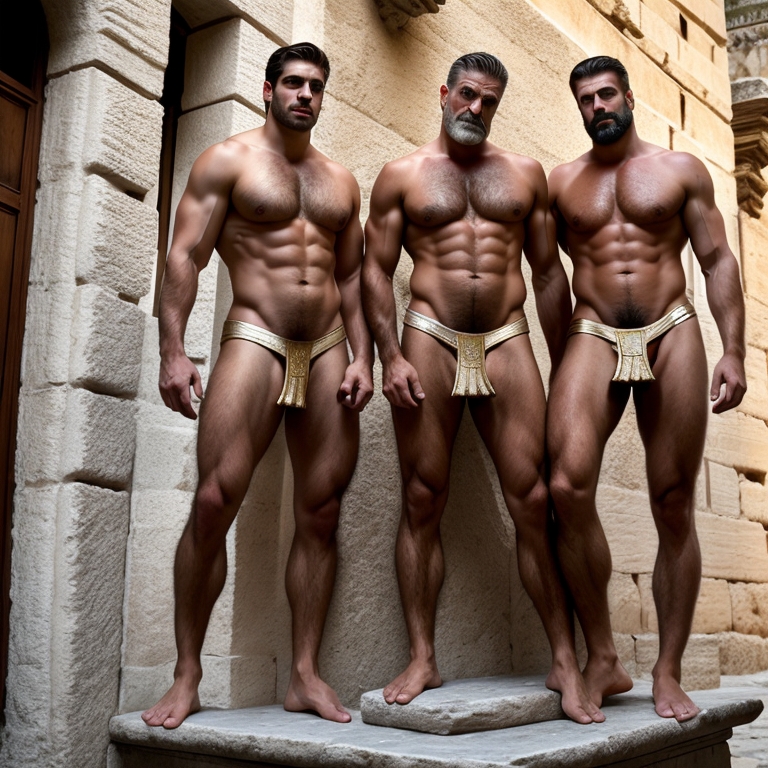Love and Conquest: Unraveling the Mystery of Alexander and Hephaestion’s Bond
Date: February 20, 2024
by: MenWhoFrench
Alexandre le Grand, une figure ayant gravé son nom dans les annales de l’histoire par ses conquêtes sans pareil, partageait un lien profond avec Hephaestion, son compagnon le plus proche. Cette relation a été l’objet d’intrigues et de spéculations pendant des siècles. Étaient-ils simplement amis, frères d’armes, ou amants ? Dans un monde où les frontières de l’amitié et de l’implication romantique étaient très différentes de notre compréhension actuelle, explorer leur relation éclaire non seulement sur ces deux figures historiques mais offre également des aperçus dans l’intricate tapisserie des normes et pratiques sociales anciennes. Cette analyse vise à plonger dans la nature de leur relation, dans le contexte des attitudes de l’Ancienne Macédoine et de la Grèce envers l’homosexualité et de l’institution grecque de la pédérastie.
Alexander the Great, a figure who carved his name into the annals of history with his unparalleled conquests, shared a deep bond with Hephaestion, his closest companion. This relationship has been the subject of intrigue and speculation for centuries. Were they just friends, brothers-in-arms, or lovers? In a world where the lines of friendship and romantic involvement were vastly different from today’s understanding, exploring their relationship not only sheds light on these two historic figures but also offers insights into the intricate tapestry of ancient societal norms and practices. This analysis aims to delve into the nature of their relationship, set against the backdrop of Ancient Macedonian and Greek attitudes towards homosexuality and the Greek institution of pederasty.
Contexte Historique de l’Ancienne Macédoine et Grèce
L’Ancienne Macédoine, souvent éclipsée par son voisin du sud plus célèbre, la Grèce, avait ses propres normes culturelles et sociétales uniques. Les Macédoniens, connus pour leur prouesse martiale et leur hiérarchie rigide, avaient des vues distinctes sur la masculinité et la sexualité. Bien que similaires à certains égards aux pratiques grecques, les attitudes macédoniennes envers les relations et la sexualité étaient influencées par leur structure et coutumes sociétales.
En contraste, la société de l’Ancienne Grèce, en particulier dans des cités-états comme Athènes et Sparte, avait une vision plus documentée et complexe de l’homosexualité. Il n’était pas rare que des hommes s’engagent dans des relations romantiques ou sexuelles entre eux. Cependant, ces relations étaient souvent liées par des règles et attentes sociétales, en particulier sous la forme de la pédérastie. Cette pratique impliquait un homme plus âgé, l’eraste, et un jeune homme, l’éromène. La relation concernait autant le mentorat et l’intégration sociale que l’implication romantique ou sexuelle.
La masculinité dans ces sociétés n’était pas seulement une question de force physique mais aussi de prouesse intellectuelle, de courage, et de la capacité à contribuer à la société. Les relations entre hommes étaient souvent vues comme un moyen de renforcer ces qualités. Ainsi, le concept de masculinité dans l’ancienne Macédoine et Grèce était multifacette et profondément entrelacé avec le tissu social.
Historical Context of Ancient Macedon and Greece
Ancient Macedon, often overshadowed by its more famous southern neighbor, Greece, had its own unique cultural and societal norms. Macedonians, known for their martial prowess and rigid hierarchy, had distinct views on masculinity and sexuality. While similar in some respects to Greek practices, Macedonian attitudes towards relationships and sexuality were influenced by their societal structure and customs.
In contrast, Ancient Greek society, particularly in city-states like Athens and Sparta, had a more documented and complex view of homosexuality. It was not uncommon for men to engage in romantic or sexual relationships with each other. However, these relationships were often bound by societal rules and expectations, particularly in the form of pederasty. This practice involved an older man, the erastes, and a younger man, the eromenos. The relationship was as much about mentorship and societal integration as it was about romantic or sexual involvement.
Masculinity in these societies was not just a matter of physical strength but also intellectual prowess, bravery, and the ability to contribute to society. Relationships between men were often seen as a way to strengthen these qualities. Thus, the concept of masculinity in ancient Macedon and Greece was multifaceted and deeply interwoven with the social fabric.

Want to listen to the rest of the article? Subscribe to the Men Who French newsletter below. This will give you access to past articles as well as new ones that come out weekly.
Sign up below!
Join the Men Who French weekly newsletter get access to more articles like the one above!
Begin receiving the “Men Who French” newsletter today. This weekly newsletter, delivered every Friday, features an exclusive article accompanied by both French audio and text. Additionally, it includes an English translation and a curated selection of fascinating French articles discovered across the internet.
